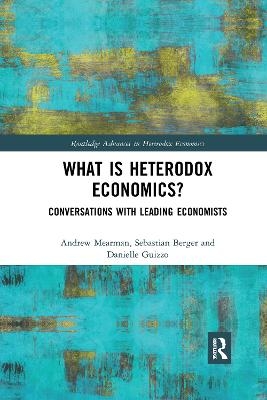
What is Heterodox Economics?
Routledge (Verlag)
978-0-367-72998-1 (ISBN)
- Titel z.Zt. nicht lieferbar
- Versandkostenfrei
- Auch auf Rechnung
- Artikel merken
Since the Global Financial Crisis, economics has been under greater public scrutiny, revealing a crisis in the discipline. This represented a potential turning point on how economics should be thought and taught. Heterodox economics has played a prominent role in these discussions revolving around new economics thinking and pluralism in economics. Yet, its identity, aspirations, and pedagogy remain underexplored, contested, and somewhat opaque.
This volume brings together sixteen interviews with leading economists to understand what heterodox economics is. How and why does an economist become heterodox? In which way do heterodox economists see themselves as ‘different’ from mainstream economics? The interviews shed light on what problems heterodox economists perceive in the mainstream; elucidate the different contexts under which they operate in higher education; and provide insights on their ontology and methodology. The reader will also find answers to the following questions about the nature and state of heterodox economics: Do heterodox economists have particular intellectual journeys, motives and aspirations? Is this reflected in their teaching practices and strategies to achieve social change? What is the relation between heterodox economics and the humanities and arts?
Appealing to a diverse audience, including philosophers, sociologists and historians of economic thought, the book will be of great interest to anyone keen to find out more about the internal discussions in the economics discipline.
Andrew Mearman is Associate Professor of Economics at the University of Leeds, UK. He has previously taught at the University of the West of England (UWE Bristol), UK; Wagner College, New York, USA; and the University of Lincoln, UK. He has published extensively on economics education, the philosophy and methodology of economics, and heterodox economics and pluralism. Sebastian Berger is Senior Lecturer in Economics at the University of the West of England (UWE Bristol), UK. He is recipient of the Helen Potter Award from the Association for Social Economics and trustee of the Kapp Foundation for the Humanization and Integration of the Social Sciences. Danielle Guizzo is Senior Lecturer in Economics at the University of the West of England (UWE Bristol), UK. She has published articles on the history of economic thought, philosophy of economics and teaching of economics.
Preface. Acknowledgements. 1. Introduction. 2. Sheila Dow. 3. Fernando Cardim de Carvalho. 4. William Darity. 5. S. Charusheela. 6. Karma Ura. 7. Rolf Steppacher. 8. Julie Nelson. 9. Tony Lawson. 10. Joan Martinez-Alier. 11. Esther-Mirjam Sent. 12. Gary Mongiovi. 13. Anwar Shaikh. 14. Victoria Chick. 15. Edward Fullbrook. 16. David Dequech. 17. Ulrich Witt. 18. Concluding Thoughts. Bibliography
| Erscheinungsdatum | 15.01.2021 |
|---|---|
| Reihe/Serie | Routledge Advances in Heterodox Economics |
| Verlagsort | London |
| Sprache | englisch |
| Maße | 156 x 234 mm |
| Gewicht | 610 g |
| Themenwelt | Geschichte ► Teilgebiete der Geschichte ► Wirtschaftsgeschichte |
| Wirtschaft ► Allgemeines / Lexika | |
| Wirtschaft ► Volkswirtschaftslehre ► Wirtschaftspolitik | |
| ISBN-10 | 0-367-72998-9 / 0367729989 |
| ISBN-13 | 978-0-367-72998-1 / 9780367729981 |
| Zustand | Neuware |
| Informationen gemäß Produktsicherheitsverordnung (GPSR) | |
| Haben Sie eine Frage zum Produkt? |
aus dem Bereich


